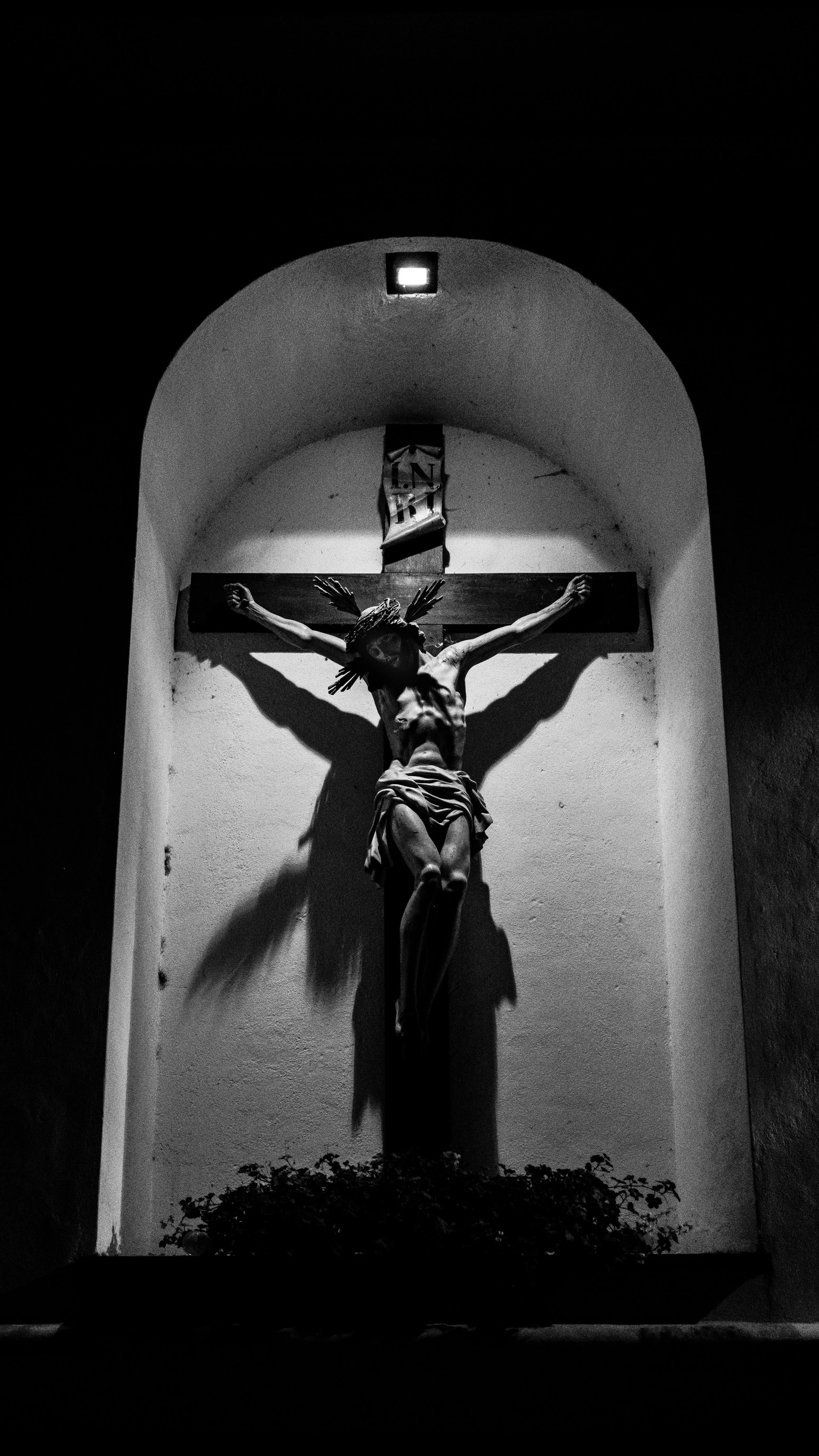The Universe Demands a Cross: This post by Samuel James is brilliant and moving. Please read it. Here is a taste, “The sterilized metaphysics of Western spirituality, the liturgies of eat-pray-love, are sieves when it comes to the bloodiness of reality. I could, if I chose, close my eyes and insist on believing in the inherent goodness of man, the brotherhood of all, and the common destiny of all but the worst people. But I could not close my eyes hard enough to un-see the blood of vaginal delivery. The blood does not merely sit there. It calls out, just as the blood of Abel cried “out from the ground.” It calls out for reckoning.”
200 People Left Our Small Church: my friend Benjamin Vrbicek asks, “How does a pastor keep his heart from growing cynical when, over 350 weeks of pastoring the same church, I have lost an average of one person each week? And why are these congregants leaving our church anyway? What role might I play, even unintentionally, in sending sheep to what they perceive to be greener pastures?”
An Open Letter to Death: Cindy Matson begins, “Dear Death, I’m writing to you today with a simple message: Stop boasting. I realize that you have some reason for pride. You have had your way with nearly every human to ever live. (Do Enoch and Elijah keep you up at night?)”
True Humanism: Jesus, Marx, or Jenner? Bruce Ashford considers the options to Christianity in contemporary culture, “[T]hese thought leaders often pose as anthropologists who find Christianity dehumanizing and as tea-leaf readers who discern in the anfractuosities of history a movement toward a more “humanized,” Christ-less future.”
Tom Brady in Retirement: Football fans out there will enjoy this.
Farewell, Sweet Easter Lily
Maundy Thursday, 4pm, 2018
“Angel, give me a call ASAP. We need to talk.”
This is not a text you want to receive from your DCS case worker.
We called immediately.
“We’ve decided to move Lily to a home closer to her half-sister.”
We hadn’t been notified that was even a possibility.
“Can we pick her up tonight?”
We talked the case worker out of that idea and into waiting until Monday.
We hung up the phone and sat in silence, shocked.
Jesus took the unleavened bread that Passover night and he gave it to his disciples, “This is my body given for you; do this in remembrance of me.”[i]
Our bond with Lily had come so naturally. She had been with us less than four months, but we were a mutual admiration society. After a couple of weeks of trauma-induced non-responsive behavior, she opened up (I reflected on that miracle here). It wasn’t long before her squeals and belly laughs filled our home. We kissed her, squeezed her, and sung and prayed over her.
We dreamed of the possibility of adopting Lilly. We didn’t know if that would be possible, but we knew that the case would be a long one. We would get to enjoy her for at least another year.
Feeling the Resurrection
Christ is risen! He is risen indeed!
What emotions do those seven words invoke in you? How does the resurrection make you feel?
What if we could feel more like God? What if we could allow God into our emotional life? This series of posts invites us to consider Holy Week as revelatory to us not just in its spiritual impact, but also its emotional impact (perhaps next year we might walk through Holy Week and consider the ramifications it has for our bodies!).
Maundy Thursday Recommendations
1. Is Easter Believable? Des Smith begins, “Is Easter believable? That’s a question people have been asking for 2000 years. It may be a question you’re asking.”
2. Is Christianity Bad News for Women? Jen Oshman responds, “[T]he Christian culture in the first century then becomes this safe place and harbor for women. Women turned to Christ, and the Christian community has been predominantly female ever since.”
3. Faith Like a Beach House: Chris Thomas begins this moving extended metaphor this way, “The excitement ebbed away with my first breath. Now, to be honest, I’m not an overly excitable guy; I’m fairly reserved in my displays of emotion, but I had been undeniably excited, that much was clear. But not any more. A week or two earlier, my wife and I had purchased on old van, circa late 70’s, that had been permanently parked on a slab of concrete”
4. An Open Letter to a Christian Disheartened by Temptation: Don Carson and John Woodbridge begin, “That you are experiencing rounds of temptation is not as unusual as you might suppose. From the inception of the church believers have found this pilgrim way to be strewn with multiple temptations.”
5. Were You There? A beautiful rendition by the Three Mo’ Tenors.
Feeling Good Friday
My wife and I curled up on our daughter’s first big girl bed. Camille was three at the time and Soren was just one year old. We picked up where we were in their children’s Bible as we read to them before they slept. I flipped the cardboard page past the story of the Last Supper to the crucifixion.
Alongside the picture of Christ hanging on a cross, the author explained, “Then bad men who didn’t like Jesus put him on a cross.”
Angel and I looked at each other quizzically. That’s it? That’s the crucifixion story? I flipped the page where the story continued with the story of the resurrection of Christ. That didn’t help. The author hadn’t even explained that Jesus had died. And what was the reason he died? Because “bad men” didn’t like him?
We both realized we would have to go off script for this story. There was much more to share about Jesus’ crucifixion with our kids than the author thought was necessary.
As a culture, we cringe at sharing hard things with our kids. We brush over disappointment and sadness and shut down negative emotions in our children. For many, this is a learned behavior. We were taught that we were only allowed to share good things with our families.
It’s not surprising, then, that we have a hard time going to dark places with God in our lives, then. But to the heights of the rescue of Christ, we must also experience the valleys of his death. God invites us to walk with Jesus into the emotions of the cross. The crucifixion of Christ isn’t a static spiritual reality, but a physical, emotional, and spiritual experience God invites us into.
The Passion of the Christ hit box offices in February of 2004 to mixed reviews. Some criticized the movie for being overly graphic in its depiction of Christ’s death. Because of their understanding of the second commandment where God instructs his people not to make any graven images, other Christians were uneasy with a depiction of Christ on screen.
Whether you loved or hated The Passion of the Christ, if you watched the movie, I doubt you forgot it. The movie flattened me emotionally and spiritually. For that, I’m grateful.
As we approach Good Friday, I invite you to experience the cross again. As you read Matthew’s account, what emotions do you think Jesus was feeling? The thief on the cross? Mary? John? The Centurion?
8 Reminders for Us this Holy Week
How is your life shaped by Easter week? I mean other than the obligatory 3 pounds that is about to be added to your waistline courtesy of honey baked ham, deviled eggs, and Reese’s Peanut Butter cups (if you’re going to put on the weight, it might as well be good… not Peeps or generic jelly beans!)?
What reminders do the final week of Jesus’ life bring to our every-day lives?
The final week of Jesus’ life takes up a disproportionate amount of the gospel narratives. Approximately a third of the gospel accounts are devoted to the final week of Jesus’ life:
· 8 of 28 chapters in Matthew
· 6 of 16 chapters in Mark
· 5 of 24 chapters in Luke
· 9 of 21 chapters in John
Of the 52 weeks of our year, Holy Week is highlighted and underlined. On this week the other 51 weeks of our year hang, on this week, the other 51 are shaped.
How does the Holy Week shape our lives?
1) Palm Sunday reminds us how different the true King is.
This Week's Recommendations
Why Pastors Must Talk About Race: Derwin Gray reminds us, “Our ethnicity is a gift from God reflecting his multifaceted wisdom. Biblical characters are not colorless or cultureless. They were people situated in real places, with real, image-bearing ethnicities, in particular cultures and times—just as we are.
An Open Letter to a Distressed Sufferer: Mike Emlet offers gentle word to those who are hurting. He concludes, “I’ll close for now. Please know that your burden is my burden and I am privileged to walk alongside you. That’s another way in which you are not alone, embedded as you are in the body of Christ.”
How the Gospel is Good News for Every Story: Scott McConnell with an insightful article on how the gospel speaks to every cultural worldview. He begins, “Missiologists often describe three worldviews different cultures exhibit: innocence-guilt, power-fear, and honor-shame. The innocence-guilt worldview believes being and doing right is what matters most. Much of what is considered right in these cultures has been codified in law, so following the law is very important. The power-fear worldview says overcoming fear by tapping into power matters most. Typically, that power is believed to be accessed from the spirit world. The honor-shame worldview says the honor and wellbeing of your group, tribe, or extended family matters most.
Sing Your Heart Out at Church (Even if You Hate the Music): Brett McCracken begins, “I love church pipe organs and classical music. I prefer Victorian hymns and Stuart Townend songs over Hillsong and Bethel. I dislike “modern renditions” of old hymns, where the melody is slightly tweaked or a new chorus is added in between original verses. A simple piano, organ, or acoustic guitar accompaniment to “Be Thou My Vision” will do just fine.”
Does God Love Me Just the Way I Am? Ligon Duncan answers the question.
Feeling Palm Sunday
One recent study has identified 27 emotions.[i] That might not sound like a lot until you try to start naming emotions. What emotions have you felt in the past week? Joy? Sadness? Anger? Frustration? What else comes to mind?
The enemy numbs our emotions. Most men I meet who are struggling with an addiction are numbed emotionally. Few are aware of the emotional numbness. It’s not uncommon for men to be unable to identify only a few emotions. An emotionally numbed person often struggles to identify any emotion at all. A common marker of emotional numbness is the response, “I don’t know.” “How are you doing?” “I don’t know.” “How did that make you feel?” “I don’t know.”
Worse still, someone struggling with an addiction often believes feelings are the enemy. It is their unhealthy appetites that got them into this situation, after all. “If I could only stop desiring,” the addict thinks, “then I would be free.”
The Anti-Hero's Final Lesson: Love
Do you know what Jonah’s final recorded words were?
Were they words of repentance? Words of gratitude? Words of praise?
Nope. They were words of spite. The last words that Jonah speaks are, “Yes, I do well to be angry, angry enough to die.”[i]
Those are not words motivated by suffering or grief. Those are words that come straight out of the hateful heart of our anti-hero, a prophet who cannot bear that God would have compassion on a city he deemed worthy of destruction and upset that the God who provided a plant for shade for him would allow it to wither.
The compassion of God knows no bounds. He orchestrates the salvation of a city that every Jew would have longed to see the destruction of. A city that was not only a military threat to the Israelites, but whose pagan worship was a stench to those loyal to the one true God.
It is the Hero who has the final say in Jonah. These final words reveal God’s love and call us to this deep compassion:
“You pity the plant, for which you did not labor, nor did you make it grow, which came into being in a night and perished in a night. And should not I pity Nineveh, that great city, in which there are more than 120,000 persons who do not know their right hand from their left, and also much cattle?”[ii]
The book of Jonah closes with a glimpse of the compassionate heart of God. Within the final verses of Jonah we see some incredible truths about the depth and power of God’s love:
God’s love is attentive:
Like a caring spouse or parent, no detail is left uncared for by our compassionate God. God’s compassion for his stiff-necked prophet is so deep, he grows a weed up over Jonah to shade him from the sun even as hatred boils in Jonah’s heart for those God loves. God’s love is for the big things (saving a city of 120,000 from destruction), but it also for the small things: Jonah’s discomfort in the heat, and even for the animals. Isn’t that final statement “and also much cattle” beautiful? God cares not just for the people of the city, but for the cattle of the city. God’s love extends to his creation.
This Week's Recommendations
What Do I Do When I Can’t Seem to Get Over My Grief? Alasdair Groves provides a nuanced answer. He asks, what do we do with “grief that just does not relent and it aches and I did not expect it to ache this long and it seems to still be aching and I’m not sure why. I cannot seem to get over it. I want to start by saying getting over it is maybe not the best way to capture the biblical response to grief.
What is Dispensationalism? Keith Mathison with a helpful explanation of an influential theological camp in America. At the heart of the difference between dispensationalism and reformed theology is this, “Dispensationalism differs from Reformed covenant theology in a number of ways, but the most significant is this idea of two peoples of God.”
You Might Be a Stingy Forgiver If… Cindy Matson begins with this, “Sometimes anger just feels so good, doesn’t it? In the moment we’re letting the other person finally get their comeuppance, we find pleasure, just as we do in all sins…”
When You Feel Small, Look to the Cosmos and the Cross: Philip Yancey concludes, “A God beyond the limits of space and time has a boundless capacity of love for his creations, no matter how small or rebellious they might be. As it happens, that message is best expressed not from a whirlwind, or burning bush, or smoking mountain—but rather person to person, through Jesus and his followers.”
Death and Taxes: I particularly appreciated the first half of this This American Life episode that focuses on hospice care.














